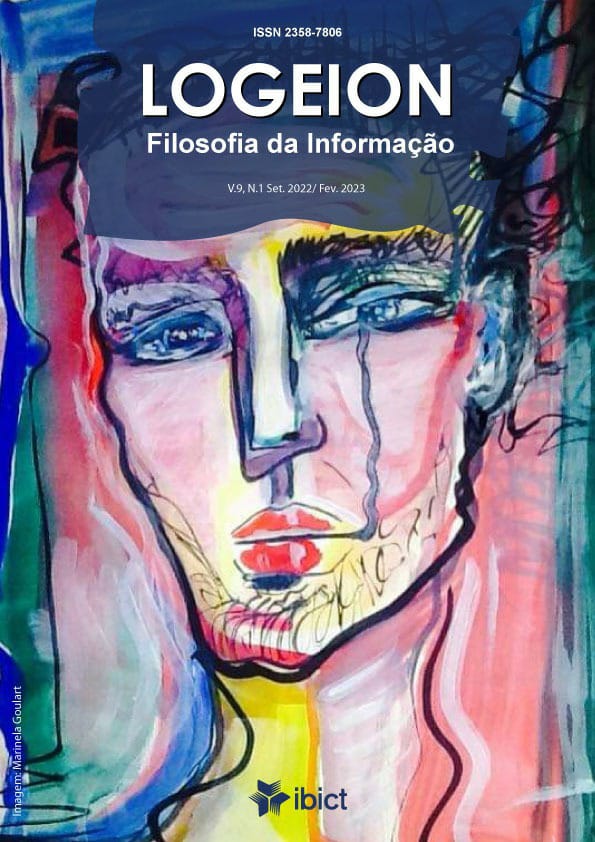Digital immersion and new ways to make science
DOI:
https://doi.org/10.21728/logeion.2022v9n1.p22-34Keywords:
Digital transformation, Internet, Open ScienceAbstract
The wide use of the Internet for countless activities led to the creation of new paradigms in human relationships and allowed significant changes in thinking, in the construction and dissemination of scientific knowledge as well as in the social structures established over time. In order to reflect on access to knowledge and its current forms of dissemination, the article presents a literature review on the subject in order to understand the main components and methodologies that have been developed by open science, mainly as a new alternative for social participation in digital environments aimed at knowledge creation.
Downloads
References
ANGLADA, L.; ABADAL, E. ¿Qué es la ciencia abierta?” Anuario ThinkEPI, Granada, v. 12, p. 292-298, 2018. Disponível em: https://doi.org/10.3145/thinkepi.2018.43 Acesso em: 06 jan. 2020
CASTELLS, M. A Sociedade em Rede. 6. ed. São Paulo. Paz e Terra, 2002
COELHO, P. Rumo à indústria 4.0. 2016. Dissertação (Mestrado em Engenharia e gestão Industrial) – Faculdade de ciências e tecnologia, universidade de Coimbra, Coimbra, 2016. Disponível em: http://hdl.handle.net/10316/3699. Acesso em: 10 ago. 2019.
CORTINA, J.; SARZI-RIBEIRO, R. Cultura Open: Desafios no Acesso ao Conhecimento Científico. In: SISPUB, 2, 2019, Curitiba. Anais [...] Curitiba: IBICT, 2019, p. 1-8 Disponível em: http://dx.doi.org/10.18225/sispub.2019.4 Acesso em: 06 jan. 2020
FOSTER. Foster Project, CC BY 2019. Disponível em: https://www.fosteropenscience.eu/taxonomy/term/113. Acesso em: 09 jan. 2020.
HARVEY, D. 17 Contradições e o Fim do Capitalismo. 1. ed. Editora: Boitempo: São Paulo, 2016.
JENKINS, H. Cultura da Convergência. Tradução: Susana Alexandria. São Paulo. Editora: Aleph, 2013. E-book.
LARANGEIRA, A. A imersão da humanidade no universo online. Revista Famecos, Porto alegre, v. 5, n. 9, p. 167-172, dez 1998. Disponível em: http://revistaseletronicas.pucrs.br/ojs/index.php/revistafamecos/article/view/3022/2 Acesso em: 27 jul. 2019.
LÈVY, P, Inteligencia colectiva: por una antropología del ciberespacio. Traducción: Felino Martínez Álvarez. Washington, DC.: Organización Panamericana de la Salud, 2004. Traducción de: L'Intelligence collective. Pour une anthropologie du cyberespac. Disponível em: https://ciudadanosconstituyentes.files.wordpress.com/2016/05/lc3a9vy-pierre-inteligencia-colectiva-por-una-antropologc3ada-del-ciberespacio-2004.pdf. Acesso em: 12 jan. 2020.
MAIA, A. Aceleração: reflexões sobre o tempo na cultura digital. Revista de Ciências sociais e humanas, Piracicaba, v. 27, n. 69, p. 121-131. 2017. Disponível em: http://dx.doi.org/10.15600/2236-9767/impulso.v27n69p99-109 Acesso em: 04 nov. 2019.
MELERO, R. La ciencia abierta (open science) bajo el paraguas de Europa. Revista IRIS- Informação, Memória e Tecnologia, Recife, v. 4, n. 1, p. 31-48, 2018. Disponível em: https://periodicos.ufpe.br/revistas/IRIS/article/view/238910/30637 Acesso em: 18 out. 2019.
MORAN, J. Mudanças na educação com as tecnologias. In: MORAN, J. A educação que desejamos: Novos desafios e como chegar lá. 5. ed. Campinas, SP: Editora Papirus, 2012.
VILAÇA, M.; ARAUJO, E. (org.). Tecnologia, Sociedade e Educação na Era Digital. Sociedade conectada: tecnologia, cidadania e infoinclusão. Duque de Caixas – RJ: UNIGRANRIO, 2016. 300 f. E-book. Disponível em: http://www.pgcl.uenf.br/arquivos/tecnologia,sociedadeeeducacaonaeradigital_011120181554.pdf Acesso em: 25 jul. 2019.
Downloads
Published
Issue
Section
License
Copyright (c) 2023 Logeion: Filosofia da Informação

This work is licensed under a Creative Commons Attribution-NonCommercial-ShareAlike 4.0 International License.
The journal is published under the Creative Commons - Attribution - Noncommercial - Share Alike 3.0 Brazil.
The published work is considered collaboration and therefore the author will not receive any remuneration for this as well as anything will be charged in exchange for publication.
All texts are responsibility of the authors.
It’s allowed partial or total reproduction of the texts of the magazine since the source is cited.














